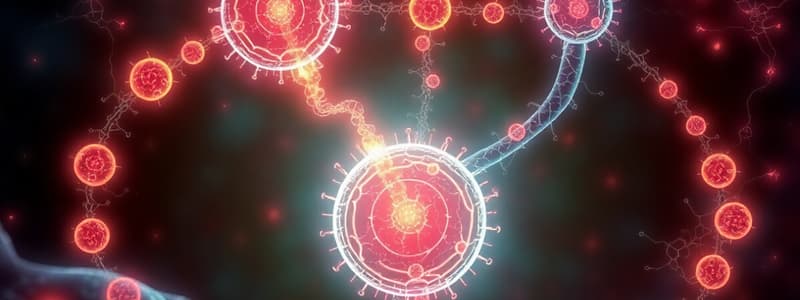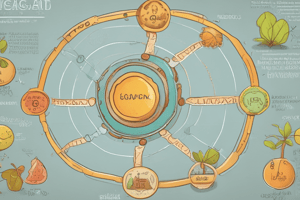Podcast
Questions and Answers
What is the function of the pyruvate dehydrogenase complex (PDHc) in cellular metabolism?
What is the function of the pyruvate dehydrogenase complex (PDHc) in cellular metabolism?
- To synthesize GTP from acetic acid
- To convert acetyl-CoA to pyruvate
- To generate NAD+ from NADH
- To oxidize pyruvate to acetyl-CoA and CO2 (correct)
Which components are vital for the regulation of the TCA cycle?
Which components are vital for the regulation of the TCA cycle?
- NADH levels only
- ATP levels and enzyme concentration
- Acetyl-CoA concentration exclusively
- Substrate availability and allosteric effectors (correct)
How does the respiratory chain utilize reducing equivalents during cellular respiration?
How does the respiratory chain utilize reducing equivalents during cellular respiration?
- By storing them as fat
- Through direct conversion into ATP without a proton gradient
- By converting them back into glucose
- By oxidizing NADH and FADH2 and acting as a proton pump (correct)
Which enzyme catalyzes a reaction in the TCA cycle that produces reducing equivalents?
Which enzyme catalyzes a reaction in the TCA cycle that produces reducing equivalents?
What role do mobile electron carriers such as coenzyme Q and cytochrome c play in the respiratory chain?
What role do mobile electron carriers such as coenzyme Q and cytochrome c play in the respiratory chain?
What is a potential consequence of a deficiency in the pyruvate dehydrogenase complex?
What is a potential consequence of a deficiency in the pyruvate dehydrogenase complex?
Which theory explains the process of ATP synthesis in oxidative phosphorylation?
Which theory explains the process of ATP synthesis in oxidative phosphorylation?
Which factor does not influence the activity of the TCA cycle enzymes?
Which factor does not influence the activity of the TCA cycle enzymes?
What is the primary action of inhibitors on the respiratory chain?
What is the primary action of inhibitors on the respiratory chain?
Which complex does cyanide inhibit in the electron transport chain?
Which complex does cyanide inhibit in the electron transport chain?
How does the binding affinity of carbon monoxide compare to that of oxygen with hemoglobin?
How does the binding affinity of carbon monoxide compare to that of oxygen with hemoglobin?
What effect do barbiturates have on the respiratory chain?
What effect do barbiturates have on the respiratory chain?
In which compartment of the cell does oxidative phosphorylation primarily occur?
In which compartment of the cell does oxidative phosphorylation primarily occur?
Which statement accurately describes the function of the mitochondrial respiratory chain?
Which statement accurately describes the function of the mitochondrial respiratory chain?
What is the main consequence of inhibiting Complex IV?
What is the main consequence of inhibiting Complex IV?
What role do inhibitors of the respiratory chain play in cellular metabolism?
What role do inhibitors of the respiratory chain play in cellular metabolism?
What is the main purpose of the citric acid cycle?
What is the main purpose of the citric acid cycle?
Which intermediate is formed from acetyl-CoA during the citric acid cycle?
Which intermediate is formed from acetyl-CoA during the citric acid cycle?
What is the significance of the oxidation of malate to oxaloacetate in the cycle?
What is the significance of the oxidation of malate to oxaloacetate in the cycle?
Which product is formed during the oxidative decarboxylation of α-ketoglutarate?
Which product is formed during the oxidative decarboxylation of α-ketoglutarate?
What is the Gibbs free energy change (ΔG°ˊ) for the formation of citrate from oxaloacetate?
What is the Gibbs free energy change (ΔG°ˊ) for the formation of citrate from oxaloacetate?
Which vitamin is NOT mentioned as a cofactor in the oxidative decarboxylation process?
Which vitamin is NOT mentioned as a cofactor in the oxidative decarboxylation process?
Why is the reaction from malate to oxaloacetate driven forward in intact cells?
Why is the reaction from malate to oxaloacetate driven forward in intact cells?
Which of the following is NOT an intermediate of the TCA cycle?
Which of the following is NOT an intermediate of the TCA cycle?
What type of reaction is the conversion of citrate to isocitrate?
What type of reaction is the conversion of citrate to isocitrate?
What is the main role of anaplerotic reactions in the TCA cycle?
What is the main role of anaplerotic reactions in the TCA cycle?
Which statement correctly describes the electron transport chain?
Which statement correctly describes the electron transport chain?
How many protons are required to drive the synthesis of one ATP according to the chemiosmotic hypothesis?
How many protons are required to drive the synthesis of one ATP according to the chemiosmotic hypothesis?
What is the function of cytochrome c in the electron transport chain?
What is the function of cytochrome c in the electron transport chain?
Why does FADH2 produce less ATP compared to NADH in the electron transport chain?
Why does FADH2 produce less ATP compared to NADH in the electron transport chain?
What is the primary control mechanism for the activity of the electron transport chain?
What is the primary control mechanism for the activity of the electron transport chain?
Which compound serves as a mobile electron carrier in the electron transport chain?
Which compound serves as a mobile electron carrier in the electron transport chain?
Which process involves the coupling of electron transport to ATP synthesis?
Which process involves the coupling of electron transport to ATP synthesis?
What is produced as a byproduct of glucose oxidation in cellular respiration?
What is produced as a byproduct of glucose oxidation in cellular respiration?
What type of metabolic pathway does the TCA cycle represent?
What type of metabolic pathway does the TCA cycle represent?
Which molecule is primarily responsible for carrying reducing equivalents in the respiratory chain?
Which molecule is primarily responsible for carrying reducing equivalents in the respiratory chain?
What happens to electron carriers in the electron transport chain after they donate their electrons?
What happens to electron carriers in the electron transport chain after they donate their electrons?
What role does ATP synthase play in cellular respiration?
What role does ATP synthase play in cellular respiration?
Where does oxidative phosphorylation primarily occur within the cell?
Where does oxidative phosphorylation primarily occur within the cell?
What is the final electron acceptor in the electron transport chain?
What is the final electron acceptor in the electron transport chain?
What is the role of the glycerophosphate shuttle in cellular metabolism?
What is the role of the glycerophosphate shuttle in cellular metabolism?
What is the primary effect of 2,4-DNP in the body?
What is the primary effect of 2,4-DNP in the body?
Which shuttle utilizes the cytosolic and mitochondrial isoforms of malate dehydrogenase?
Which shuttle utilizes the cytosolic and mitochondrial isoforms of malate dehydrogenase?
Superoxide dismutase plays a crucial role in the detoxification of which type of reactive species?
Superoxide dismutase plays a crucial role in the detoxification of which type of reactive species?
Which metabolic pathway is primarily affected by the inhibition of ATP synthase?
Which metabolic pathway is primarily affected by the inhibition of ATP synthase?
What is a significant consequence of generating heat in brown adipose tissue?
What is a significant consequence of generating heat in brown adipose tissue?
Which enzyme is responsible for transaminating glutamate to form aspartate?
Which enzyme is responsible for transaminating glutamate to form aspartate?
How many molecules of ATP are produced when glucose is fully oxidized?
How many molecules of ATP are produced when glucose is fully oxidized?
The malate shuttle is primarily utilized for transporting which type of equivalents?
The malate shuttle is primarily utilized for transporting which type of equivalents?
What mechanism allows 2,4-DNP to promote weight loss?
What mechanism allows 2,4-DNP to promote weight loss?
Study Notes
Pyruvate Oxidation
- Pyruvate is oxidized to acetyl-CoA and CO2 inside the mitochondria
- Pyruvate dehydrogenase complex (PDHc) is responsible for this process
- PDHc contains three enzymes: E1, E2, and E3
- Four water-soluble vitamins are crucial for pyruvate oxidation: thiamin, riboflavin, niacin, and pantothenic acid
- Lipoate is also involved in the process
- PDH is regulated by allosteric effectors and covalent modification
- Deficiencies or dysregulation of PDHc can have clinical significance
TCA Cycle
- Acetyl-CoA is oxidized in the TCA cycle to generate CO2, reducing equivalents (NADH & FADH2), and GTP
- The cycle consists of eight enzymatic steps:
- Citrate synthase catalyzes the formation of citrate from oxaloacetate and acetyl-CoA
- Aconitase converts citrate to isocitrate
- Isocitrate dehydrogenase oxidizes isocitrate while forming NADH and CO2
- Alpha-ketoglutarate dehydrogenase complex (α-KGDH) is similar to PDHc and catalyzes the formation of succinyl-CoA, NADH, and CO2
- Succinyl-CoA synthetase converts succinyl-CoA to succinate, producing GTP
- Succinate dehydrogenase catalyzes the oxidation of succinate to fumarate, producing FADH2
- Fumarase converts fumarate to malate
- Malate dehydrogenase produces oxaloacetate from malate, generating NADH
- The cycle is highly exergonic and thermodynamically favorable
- The TCA cycle is regulated by substrate availability and allosteric effectors
- Dysregulation of TCA cycle enzymes, such as SDH, can have clinical significance
Oxidative Phosphorylation and ETC
- Four protein complexes (I, II, III, IV) and mobile electron carriers (Q & cytochrome c) are involved in the ETC
- The respiratory chain oxidizes reducing equivalents (NADH and FADH2), acting as a proton pump
- The chemiosmotic theory explains ATP synthesis through proton gradient generation across the inner mitochondrial membrane
- Inhibitors can block specific steps in the ETC or oxidative phosphorylation, including rotenone, cyanide, antimycin A, and oligomycin
- The glycerol phosphate shuttle and malate-aspartate shuttle transfer reducing equivalents from the cytoplasm to the mitochondria
- Superoxide dismutase protects the ETC from oxidative damage
Electron Transport Chain
- The ETC (respiratory chain) involves the sequential transfer of electrons from NADH or FADH2 to oxygen
- Complex I (NADH-Q oxidoreductase) receives electrons from NADH and transfers them to Q
- Complex II (succinate-Q reductase) receives electrons from FADH2 and transfers them to Q
- Complex III (Q-cytochrome c oxidoreductase) accepts electrons from Q and passes them to cytochrome c
- Complex IV (cytochrome c oxidase) receives electrons from cytochrome c and transfers them to oxygen, producing water
Oxidative Phosphorylation
- The proton gradient generated by the ETC drives ATP synthesis
- ATP synthase uses the gradient to phosphorylate ADP to ATP
- The ETC and oxidative phosphorylation generate ATP efficiently from glucose oxidation
- FADH2 produces less ATP than NADH due to its entry point in the ETC
Amphibolic Nature of TCA
- The TCA cycle is amphibolic, meaning it plays roles in both energy production and biosynthetic pathways, including gluconeogenesis, amino acid synthesis, and fatty acid synthesis
- Anaplerotic reactions replenish TCA cycle intermediates, ensuring its continuous operation### ATP Synthase
- Inhibits oxidation and phosphorylation by blocking proton flow through ATP synthase.
Glycerol 3-phosphate Shuttle
- Transfers reducing equivalents from cytosol to mitochondrial matrix
- Utilizes cytosolic and mitochondrial isoforms of Glycerol-3-P DH.
Malate Shuttle
- Transfers reducing equivalents from cytosol to mitochondrial matrix.
- Utilizes cytosolic and mitochondrial isoforms of Malate DH.
- The same enzyme but different locations.
Glutamate-Oxaloacetate Transaminase
- Also known as Aspartate aminotransferase.
- Transports reducing equivalents from cytosol to mitochondrial matrix.
Brown Adipose Tissue
- Rich in mitochondria to generate heat (thermogenesis).
- 2,4-Dinitrophenol (2,4-DNP) increases uncoupling in brown adipose tissue.
- Increases mitochondrial permeability and reduces ATP synthesis, leading to increased heat production.
Superoxide Dismutase
- Neutralizes superoxide radicals (O2-)
- Superoxide radicals are reactive oxygen species.
Studying That Suits You
Use AI to generate personalized quizzes and flashcards to suit your learning preferences.
Related Documents
Description
Explore the intricacies of pyruvate oxidation and the TCA cycle in this quiz. Focus on the key processes, enzymes involved, and the importance of specific vitamins in energy metabolism. Test your understanding of metabolic pathways and their regulation.




